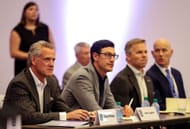The ongoing antitrust battle between 23XI Racing, Front Row Motorsports, and NASCAR saw a pivotal turn in June 2025 when a federal judge ruled on financial disclosures from Cup teams. The ruling allows NASCAR's legal team to access team financial data and directly counter claims that the charter system and league structure create unfair financial pressure.
The courtroom spotlight returned to Charlotte with three major developments in the past month. First, U.S. District Court Judge Kenneth Bell denied a motion from 23XI and Front Row to dismiss NASCAR's counterclaim, which alleges that teams colluded to negotiate better charter terms. Second, Bell sided with non-litigant teams by shielding them from disclosing highly detailed financial information, including salaries, manufacturer contracts, and sponsorship values.
Finally, and most crucially, Bell ordered those 12 teams to submit average per-car revenues, costs, and profits dating back to 2014 to an independent accounting firm. The judge ruled that only legal counsel and court-appointed experts may view the anonymized data. Lead attorney for the 12 teams, Adam Ross, said (via AP):
"It would be absolutely devastating to these race teams if their competitors were able to find out sponsorships on the cars, driver salaries and all revenue streams. It cannot make its way into the public realm... NASCAR has gone a step too far."He also accused NASCAR of 'fishing' for evidence. The data would help them disprove the lawsuit by identifying a profitable team and painting 23XI Racing and Front Row Motorsports as exceptions, rather than proof of systemic failure.
This stripped-down yet still powerful financial information could arm NASCAR with one of its most persuasive arguments. If even one or two anonymized entries show profitability or sustainability under the current system, they could assert that success is still attainable without violating antitrust laws.
 Commissioner Steve Phelps speaks at Daytona International Speedway on February 15, 2024. Source: Getty
Commissioner Steve Phelps speaks at Daytona International Speedway on February 15, 2024. Source: GettyAnd if others are surviving or thriving, under similar constraints, it weakens the plaintiffs' claim that the system itself is rigged. That distinction may be critical to swaying a jury, particularly when the structure in question involves a $7.7 billion broadcast and charter ecosystem. In response, a coalition of five teams forcefully pushed back against the court's data demands.
The teams highlighted that they didn't want to provide sensitive internal information like advertising revenue, especially to a league that also courts the same sponsors. However, despite their concerns, Judge Bell sided with NASCAR's request for condensed information, agreeing it was useful for evaluating financial viability claims.
That decision not only limits the privacy concerns for the rest of the grid but also undermines 23XI and Front Row's case. It prevents the plaintiffs from leveraging individual team struggles as evidence of an exploitative monopoly, while giving NASCAR a broad sample size to argue that financial success or failure is more about execution than structure.
While Denny Hamlin remains confident, the coming months will shape whether the current model survives legal scrutiny or is forced into major reform.
What happens next in NASCAR's favor after all the June rulings gives them an upper hand?
 (Left) NASCAR Commissioner Steve Phelps, Joey Logano during the 2025 Hall of Fame Voting Day. Source: Getty
(Left) NASCAR Commissioner Steve Phelps, Joey Logano during the 2025 Hall of Fame Voting Day. Source: GettyThe financial disclosure judgment is one of many small but significant legal wins NASCAR has tallied over the past month. Earlier, a June 5 ruling by a U.S. appeals court reversed the 2024 injunction that allowed 23XI Racing and Front Row Motorsports to retain their charters, giving them the leverage.
While the hearing was supposed to be on June 20, it has been delayed. The injunction could go into effect from tomorrow (June 27), unless 23XI or FRM decides to repeal or request the U.S. Supreme Court. If the rehearing motion fails, the league could demote both teams to open/uncharted status in the Cup Series, forcing them to qualify weekly without guaranteed purse money.
That would not only add operational risk for the teams but also signal to others that legal rebellion has consequences. The plaintiffs also argue that the Next Gen car's costs, revenue-sharing model, and event control (including ownership of 20 of 38 race venues) form a monopolistic structure.
While Judge Bell has reprimanded all parties involved for not settling the dispute outside the court, citing legal expenses, the trial is set for December 1.
Why did you not like this content?
- Clickbait / Misleading
- Factually Incorrect
- Hateful or Abusive
- Baseless Opinion
- Too Many Ads
- Other
Was this article helpful?
Thank You for feedback
About the author
Get the latest NASCAR All-Star race news, Xfinity Series updates, breaking news, rumors, and today’s top stories with the latest news on NASCAR.
Edited by Riddhiman Sarkar

.jpg) 4 hours ago
1
4 hours ago
1

 English (US)
English (US)